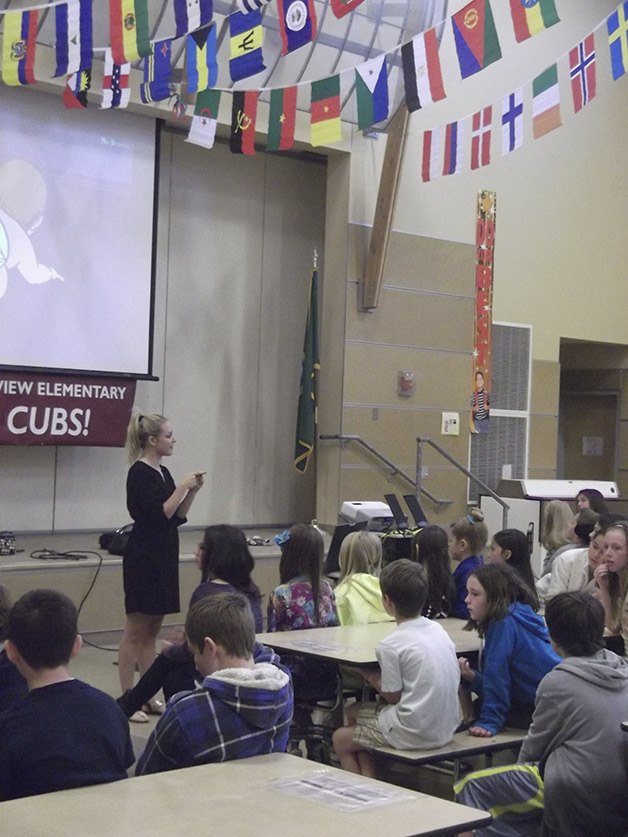By Kira Clark
Staff Intern
When Stefanie Thomas of the Seattle Police Department asked fifth grade students at Cascade View Elementary if they’d ever been bullied online, a third of the hands in the room shot up.
The Internet safety presentation, held Monday, June 3, was intended to give future middle school students an awareness of the potential dangers of online activity.
During her days off from the department, Thomas is hired by schools to talk about cyber safety. This slight, 28-year-old University of Washington grad has made hundreds of trips to Eastside schools, urging children to be aware of the Internet’s realities.
Designed to help children learn how to protect themselves online, Thomas’ presentation covered cyber bullying, Facebook, gaming websites, and privacy precautions.
The talk was the first time Thomas has spoken at Cascade View Elementary.
Principal Ray Wilson is hopeful that her presentation will spark conversations between students and parents about appropriate Internet activity. The elementary school aims to teach children to be respectful, responsible, and safe—all qualities necessary for conscientious Internet users. Children ages 8 to 18 spend more than seven and a half hours a day using a smart phone, computer, television or other kind of electronic device, according to the Kaiser Family Foundation.
“As these kids are moving on to middle school, they are going to have a lot more freedom,” Wilson said. “This is a great opportunity for them to start talking to their parents.”
Wilson said, turning to the room, “All right, I want everyone sitting on their pockets.” He instructed the students to give Thomas their full attention. “We want to set you up for success,” Wilson said to the fifth grade students. That means making wise choices about the Internet.
“Raise your hand if you are on Facebook,” Thomas said. A fourth of the hands shot up. Facebook users are required to be at least 13 years old—all the children in the room were under 11. “None of you are legally allowed to be on facebook,” Thomas said. “You have broken the law.”
Thomas cautioned students to remove all personal information from their public profiles. Privacy settings do not matter, there are ways around them.
“If you wouldn’t give personal information to random people on the street in downtown Seattle why are you posting it online?” Thomas asked.
Thomas played a short video to demonstrate how easy Internet stalking is. Within 20 minutes an Internet stalker on a music sharing chat room for teens found out a user’s full name, address, mother’s name, time she would be home, school, and phone number. The only information which was public on her profile was her hobby list and screen name, Teresa01.
Most cyber-bullying of elementary school children occurs in online games, Facebook, e-mail, or through text messaging. Bullying begins on the playground and often continues after school hours via technology. Thomas warned the group that fifth graders can get in trouble with the law for what they do online.
“If I put something on the Internet, can I really delete it? Is it really gone?” Thomas asked. “There are records of every single website you have ever been to on the Internet.” In the state of Washington it is illegal to post anything online to intimidate, torment, or embarrass anyone. Thomas’s unit has charged children as young as 11 with cyber-bullying.
If a child experiences cyber bullying, she should save a record of the attack and report the incident to an adult.
“If you are not going to do it in real life, then you should not do it online,” Thomas said. To learn more about cyber-bullying, go to www.cyber-safety.com.


